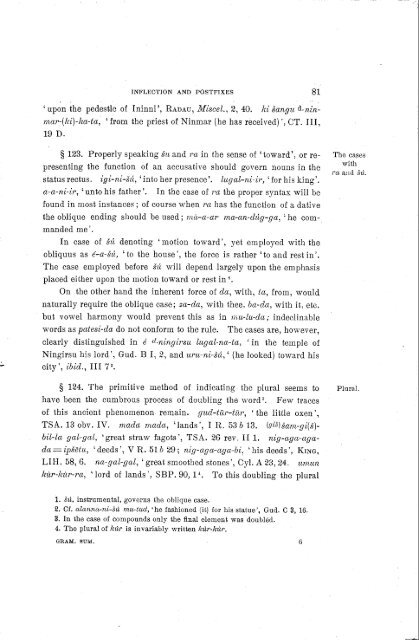You also want an ePaper? Increase the reach of your titles
YUMPU automatically turns print PDFs into web optimized ePapers that Google loves.
INFLECTION AND POSTFIXES 81<br />
'upon the pedestle of Ininni', RADAU, Miscel., 2, 40. ki sangu d·nin<br />
mar-(ki)-ka-ta, 'from tbe priest of Ninmar (be bas received)', CT. III,<br />
19 D.<br />
§ 123. Properly speaking su and ra in the sense of 'toward', or re<br />
presenting tbe function of an accusative should govern nouns in tbe<br />
status rectus. igi-ni-sú,' into her presence'. lugal-ni-ir,' for bis king '.<br />
a-a-ni-ir, 'unto bis father'. In tbe case of ra tbe proper syntax wiII be<br />
found in most instances ; of course wben ra has tbe function of a dative<br />
the oblique ending sbould be used; ma-a-ar ma-an-dúg-ga, 'he commanded<br />
me'.<br />
In case of sú denoting 'motion toward', yet employed with tbe<br />
obliquus as é-a-Sú, 'to the house', tbe force is rather 'to and rest in'.<br />
<strong>The</strong> case employed before sú wiII depend largely upon the emphasis<br />
placed eitber upon tbe motion toward or rest in 1.<br />
On the other hand the inherent force of da, with, ta, from, would<br />
naturally require the oblique case; za-da, with thee, ba-da, witb it, etc.<br />
but vowel barmony would prevent this as in mu-lu-da,. indeclinable<br />
words as patesi-da do not conform to the rule. <strong>The</strong> cases are, however,<br />
clearly distinguished in é d.ningirsu lugal-na-ta, 'in the temple of<br />
Ningirsu his lord', Gud. B 1,2, and uru-ni-Sú, ' (he looked) toward bis<br />
city', ibid., III 7'.<br />
§ 124. <strong>The</strong> primitive method of indicating the plural seems to<br />
have been tbe cumbrous process of doubling the word '. Few traces<br />
of this ancient phenomenon remain. ,qud-tür-tür,' the little oxen',<br />
TSA. 13 obv. IV. mada mada, 'lands', I R. 53 b 13. (gii'i)sam-gi(s)<br />
bil-la gal-gal, 'great straw fagots', TSA. 26 rev. II 1. nig-aga-aga<br />
da = ipseiu, 'deeds', V R. 51 b 29; ni,q-aga-aga-bi, 'bis deeds', KING,<br />
LIH. 58,6. na-gal-gal,' great smootbed stones', CyI. A 23,24. wnun<br />
kur-kür-ra, 'lord of lands', SBP. 90, 14• To tbisdoubling the plural<br />
1. su, instrumental, governs the obligue case.<br />
2. Cf. alanna-ni-Sú mu-tud, 'he fashioned (it) for his statue', Gud. e 3, 16.<br />
3. In the case of compounds only the final element was doubléd.<br />
4. <strong>The</strong> plural of kur is invariably written kur-kur.<br />
GRAM. SUMo 6<br />
<strong>The</strong> cases<br />
with<br />
ra alld su.<br />
Plural.
















